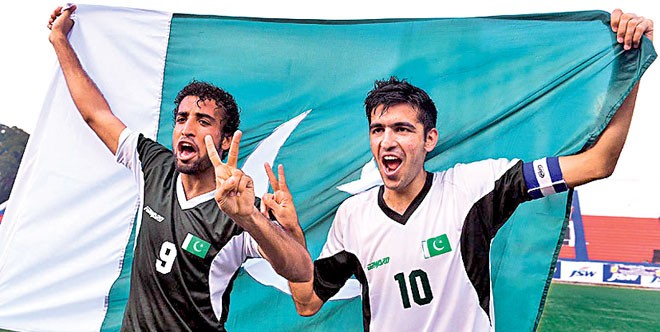
One hopes the common Pakistani understands the efforts and worth of their national football team

In a land of cricket worshippers, there lies a beautiful game they call football. Never the centre of attention, Pakistan’s football has always been overshadowed by cricket and a rather disarrayed hockey. After Pakistan’s early dismal show in the 2015 Cricket World Cup, my new favorite question to every cricket fan in the country is ‘why don’t you try supporting your football team for a change?’
Pakistan football team will soon fly out to Doha, Qatar, ahead of their 2018 FIFA World Cup Qualifier tie first-leg against a prolific Yemen side on March 12, before returning to the Punjab Stadium in Lahore to lock horns in the second-leg on March 17.
Seeking revenge on brisk Afghanistan, who beat Pakistan 3-0 in Kabul, Denmark-based Hassan Bashir’s inclusion toppled the Afghans on February 6 after Muhammad Riaz and Saadullah scored in a 2-1 home victory.
Playing with all their heart and passion in front of a rather rich home support, the team played without some first choice players such as Muhammad Ahmad of ISA Town, Pahang’s Zesh Rehman, Denmark-based Nabil Aslam and Dordoi-duo Kaleemullah and Muhammad Adil.
The win sent a new wave of strength among the faithful fans and supporters who try to promote the game in the country.
It would not take a philanthropist to note the influence foreign-based players have had on the team. The perfect mix and match has produced a far better side than Pakistan produced in the last decade or two.
After the camp in Lahore, the team took off for Malaysia to prepare for the Yemen tie, where they beat Malaysia’s Under-19 team convincingly, but lost out to the Under-22s. With veteran Zeeshan Rehman, Dordoi-trio and left-fullback Ahmad to feature in the Pak-Yemen WCQ, the team looks set to give it all.
Turning our attention to the exhilarating tie, the question changes face to ‘can we beat Yemen?’
The two sides previously met in the 1994 World Cup Qualifiers when a beastly Yemen side thrashed Pakistan 5-1 in Ibrid, before cruising to a 3-0 victory in the second-leg in China.
However, times have changed. There is a different, positive, vibe about the Pakistan team altogether. With the ongoing insurgency in Yemen (strong enough to enforce the first-leg in Qatar), the Yemenis are bound to be in a state of distress. (Not denying the possibility that it might instigate a worldly performance from them instead, as people of Yemen are trying to find solace through sports in these tough times.)
The Yemenis, tactically, are a defensive side who like to play out the 90 minutes with ease instead of forcing attacks.
They are a resilient nation and take pride in playing the beautiful game. They don’t mind not scoring, as long as they are not conceding.
They rely on three to four experienced players and the rest of the Yemen team is dominated by youth, much like Shamlan’s preferred colts.
For the away leg in Doha, coach Mohammad Shamlan should field a defensive-minded team. The priority in the first-leg should be keeping a clean-sheet. Any result with a one goal deficit should be accepted.
According to my line of thought, Pakistan need to sit tight in the away leg and let the Yemenis attack. With Zesh’s and Nabil’s experience at the heart of the defence, it should not be difficult to shut shop. Mobile full-backs Ahsanullah and Ahmad will only complement the back-four. The approach here is old school counter-attacking football, playing 4-2-3-1.
The current Yemen side is known to be rather inconsistent in the final-third of the opposing half. That brings us to deciding the defensive end of the midfield. With Saddam’s height and physique, he fits perfectly in one-half of the double pivot, along with KRL’s Bilawal-ur-Rehman.
A single imprecise touch and Pakistan can break with the likes of Dordoi’s Adil and the stupendously in-form Muhammad Riaz, from either wing. It is important to mention that a counter-attacking side needs to have wide players. With Adil’s exuberant pace and Riaz’s undying stamina, that should not be an issue. With confirmation of Muhammad Ali’s inclusion in Shamlan’s squad, the team will have three star players, all foreign-based, who can play as first choice forwards.
If Pakistan do play the defensive-minded counter-attacking football they should, the scenario should settle with Kaleemullah playing as the lone striker (this enables Kaleem and Adil to link as they have so many times before for their Kyrgyzstani club Dordoi); the comparatively slow-paced Hassan Bashir sitting just behind him in the central-attacking-midfielder (CAM) position; and Muhammad Ali on the bench, along with young-gun Saadullah.
Taking one match at a time, a positive result in Doha will definitely give Pakistan the edge in the second-leg, which is to be contested at the team’s Eden at Punjab Stadium in Lahore.
One hopes the common Pakistani understands the efforts and worth of their national football team and supports it in these times of upheaval. Now is the time to stand by the team and show all out support for the betterment of football in Pakistan.
With the stage set, it is up to Shamlan’s men to back our faith, support and belief in this aspiring Pakistan side.
The famous Serbian footballer Vujadin Boskov once said, "Football is unpredictable, as all games begin 0-0". Come on you Green-shirts!